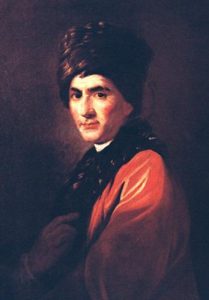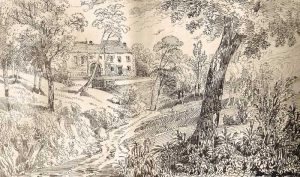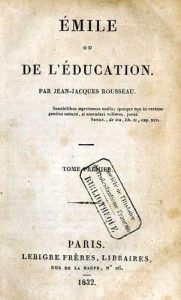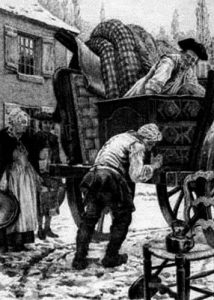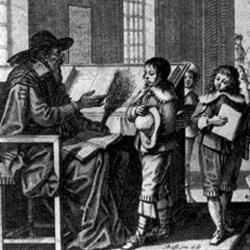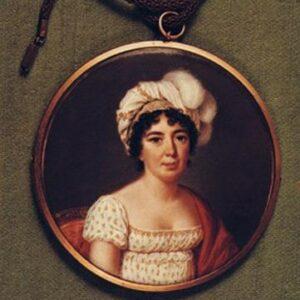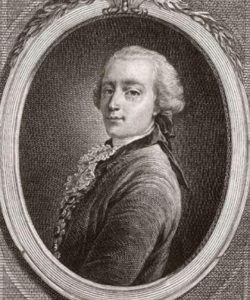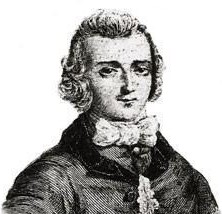His childhood in Geneva
Jean-Jacques Rousseau was born on 28th June 1712 in Geneva. He always remained fond of his native town, even though he did not actually live there much ; indeed, from 1750 onwards, when signing his many works, he never forgot to mention that he was a Citizen of Geneva.
His childhood was mostly spent in Geneva. Sadly, his mother, (whose father was a pastor) died only a few days after his birth. However, he spent a happy childhood with his father, who had a loving nature. He brought his son up carefully, encouraging him to read all kinds of works, some very advanced for his age, which meant that he was far ahead of his peers in his level of education. Later, he was apprenticed by his uncle to an engraver but as he was unhappy he decided to flee from Geneva when he was still a teenager. This was the beginning of the long, interesting epic journey which would last most of his lifetime.
Madame de Warens wielded much influence over him and was also instrumental in his conversion to Catholicism
To begin with, the young Rousseau stayed with a friend, Madame de Warens, who lived in Savoie, only a few kilometres away from Geneva. He was 12 years younger than thisexceptional friend ;who was instrumental in his conversion to Catholicism – this was the price he paid for his decision to settle in France. However, she also taught him music and gave him a good education, instilling in him an essential awareness of the beauties of his natural environment ; this was to be of great importance in his later works on “life in society”.
When he broke off his friendship with Madame de Warens he moved to Lyon (1740) and later to Paris (1742), where his general culture and some letters of recommendation enabled him to be introduced into the scholarly world of the Enlightenment and the Encyclopaedia. Due to personal contacts and his talents he was appointed French Ambassador to Venice in 1743, here he met many interesting people including Goldoni and he also discovered the arcane mysteries of politics for the first time with its twisted manipulations of power.
He returned to Paris in 1745 and would in future, often stay there for long periods of time, working on several articles for the Encyclopaedia and becoming friendly with the other contributors to this institution. However he never really settled definitively in the capital because he often quarrelled with his friends, such as Voltaire, d’Alembert and even Diderot who was close to him.
The Discours sur les Sciences et les Arts made him famous
In 1749, Rousseau started writing the philosophical works which would make him widely recognized by his contemporaries. It is a well-known incident : he was visiting Diderot, who had been imprisoned in Vincennes for having published the Lettre sur les Aveugles. Duringtheir conversation together he learnt of the Academy of Dijon’s essay contest on the question “Has the restoration of the sciences and arts tended to purify morals ?” He was carried away by this subject and impatient to get down to work as soon as possible – it is said that he received “divine inspiration” at Vincennes. Encouraged by Diderot, he wrote his “Discours sur les Sciences et les Arts” an essay in which he claimed that progress in the arts and sciences did not affect the improvement of morals in any way. It was the system of justice implemented by social institutions which was directly related to problems of morality.
His essay won the prize of the Academy of Dijon and he became famous. Geneva accepted him back again as a citizen and in 1754 he also returned to Protestantism – his native town was so delighted with this that they did not demand a statement of repentance ; this would have been the normal procedure for a citizen of the town who had formerly renounced his protestant faith and then gone back to it at a later date.
His philosophical works
He then proceeded to develop the main theses set out in his essay. He was particularly concerned by the lack of harmony between the beauty of nature and the injustice brought about by life in society, which included the evils incurred by its institutions. He wondered whether it was perhaps impossible to change this situation.
He considered the history of different civilizations, from the age of palaeontology onwards and suggested that if certain standards had been imposed in an authoritarian manner in the name of natural law, it would have been possible (and it would still be possible today), to make rational choices. He suggested that an act of general will, founded on reason, could guide civilization to real social progress, towards the harmony which we see demonstrated in nature.
However, it was only “La Nouvelle Héloise” (1759) which achieved true success ; his other works, “Discours sur l’origine et les fondemants de l’inégalité” (1754) and “Discours sur l’économie”(1755), in which he developed his main ideas and desire to reform society, were not so well received.
Criticism became hostile in 1762, when he published Le Contrat social and”De l’Emile”, to which he later added “Profession de foi du Vicaire Savoyard” (1762).
The "scandal" of de L'Émile
In l’Emile, Rousseau considered the problem of education ; he asked himself whether those who had the responsibility of guiding a child to adulthood were really carrying out this task with all the intelligence and capacities required. He set out the following paradox : although a child is born good by nature an adult has become morally contaminated by an evil world contrary to the harmony of nature. He advocated a balanced form of education based on justice, giving practical examples to illustrate his ideas which were sometimes unusual in their nature.
Apart from teaching the child to love and respect nature, one of the main aims of education was to learn how to co-habit with others, with his fellowmen even if they seemed different to himself. The child had to understand the difficulties inherent in the existence of other people around him – these had to be overcome in such a way that he would not be aggressive to his fellow men. Rather, he would become, little by little, an adult, responsible citizen who could contribute to his city and work for the improvement of morality.
Voltaire remarked that Rousseau had not looked after the education of his own children at all, but simply abandoned them to the orphanage. And this was perfectly true : five children had been born to Rousseau and his companion Thérèse Levasseur and they had indeed been abandoned in this way. But perhaps the argument of Emile was that, to prevent such tragedies from happening, the local authorities should be held responsible for the well-being of such infants.
The Confessions
Voltaire’s accusation struck home and upset Rousseau, who then decided to defend himself, to explain about his life without trying to hide his difficulties or the contradictions inherent in his character. Like Saint Augustine a long time before him, he undertook to write the impressive Confessions, which he started in 1769. In this work, published after his death, he explained what led him to undertake certain actions or to have certain feelings, which were often entangled and complicated. At all times he sought truth, authenticity and the guiding light of reason – he was incapable of sacrificing these ideals to the conformism of social rules, which, more often than not, only resulted in a lack of justice which was in opposition to the harmony of nature.
“The trumpet of the Last Judgement may sound at any time, for I will come with this book in my hand to stand before the sovereign judge. I will say out loud “This is what I have done, what I have thought, what I have said…I have revealed my innermost thoughts as you yourself have seen them. Eternal being, gather around me the immense throng of my fellow-beings – let them listen to my confessions, groan at my humiliations, blush at my unhappiness. Let them, too, reveal to you what is in their hearts with the same sincerity at the foot of your throne ; and then let any one of these dare to say that he was a better man than I.”
At the end of his life he travelled from place to place, trying to flee from everyone. Despite the efforts of his closest friends, he decided to live a solitary existence and wrote the “Rêveries du Promeneur Solitaire”. Rousseau died on 2nd July 1778 in Ermenonville ; the Marquis de Girardin had cleverly arranged for Thérèse Levasseur, who had been his companion for 40 years, to be able to share his home. In 1768 they were married. In 1794 his ashes were transferred to the Panthéon ;
Rousseau and religion
Although he had often been attracted by the Catholic faith at different periods of his life, Rousseau never forgot the protestant upbringing he had received as a young child. Like many of his contemporaries, Rousseau had definitely criticized religious institutions, which he considered were often obsessed with maintaining their temporal power here on earth. And he denounced their abuse of authority, which they imposed on believers in the name of “revealed truth”. He stated, that because of this “revealed truth”, their particular, exclusive domain, many half-truths came into being. This is what he expressed in the “Profession de foi du Vicaire Savoyard”.

